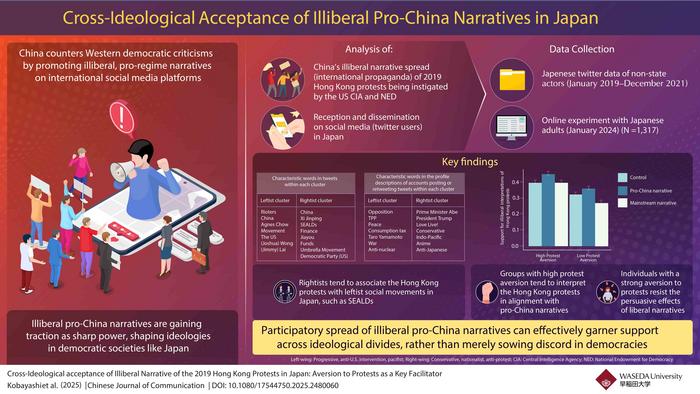In the digital age, the proliferation of narratives across borders, especially those rooted in polarizing ideologies, poses considerable challenges to democratic societies. Recent research conducted by a team of scholars from Japanese universities has deepened our understanding of how illiberal pro-China narratives surrounding the 2019 Hong Kong protests have transcended ideological boundaries in Japan. Led by Professor Tetsuro Kobayashi from Waseda University, the study delves into the dynamics of social media interactions and the interplay of historical contexts influencing perceptions about global democratization and authoritarianism.
Social media platforms have emerged as powerful vehicles for the dissemination of information, often blurring the lines that separate traditional propaganda channels from grassroots discourse. As noted in the research, this phenomenon is particularly striking in Japan, where pro-China narratives have infiltrated both left-wing and right-wing social discussions. The researchers analyzed vast amounts of Twitter data to better understand how and why these narratives gained traction among different political ideologies in Japan.
One of the cornerstone narratives examined in the research is the portrayal of the Hong Kong protests as a US-backed insurrection, allegedly orchestrated by organizations like the CIA and the National Endowment for Democracy (NED). This framing aims to undermine the legitimacy of the pro-democracy movements by casting them as foreign-instigated disruptions. The research team sought to unravel how such a narrative was accepted and propagated, a task made feasible through computational social science techniques.
By conducting rigorous qualitative analyses of tweets and their context, the research team highlighted how both left-leaning and right-leaning segments of the Japanese populace engaged with these pro-China narratives. This broad acceptance is indicative of a societal trend where ideological adversaries find common ground, particularly when historical grievances or nationalistic sentiments are exploited. It illustrates a crucial point: narratives from authoritarian regimes can form a kind of bridge over ideological divides when they resonate with local sentiments.
Additionally, the research included an experimental component involving online simulations designed to test reactions to exposure to these narratives. Preliminary findings suggest that cultural attitudes toward dissent and protest play a significant role in shaping public opinion. Japan’s historical aversion to protest movements may create a fertile ground for illiberal narratives, leading to a sympathetic interpretation of authoritarian perspectives.
The implications of this research are far-reaching, particularly in the context of global democratic backsliding. It emphasizes the importance of understanding how illiberal ideologies can naturally permeate various strata of society, from political elites to everyday citizens. If not critically examined, these narratives can lead to an erosion of democratic values and hinder grassroots resistance to authoritarianism.
Moreover, Kobayashi and his colleagues contend that the study underscores a vital need for rethinking the nature of political participation. Not all forms of participation are liberal or democratic; some may contribute to perpetuating authoritarian narratives. This shifting landscape calls for a reevaluation of how movements and protests are perceived within the broader framework of democracy and civic engagement.
In summary, the research conducted provides valuable insights into the mechanics of narrative acceptance and propagation within political divides. The team’s analysis demonstrates that the spread of illiberal narratives cannot be easily confined to a single ideological camp. Instead, they reveal a complex interplay between culture, history, and socio-political contexts that shapes public attitudes in democratic societies.
As we witness this phenomenon unfolding not just in Japan but globally, it calls for heightened vigilance among scholars, policymakers, and citizens alike about the narratives we consume and share. Understanding these dynamics is critical to preserving democratic integrity and resisting attempts by authoritarian states to manipulate public opinion in foreign contexts.
This thorough exploration of how illiberal narratives permeate differing ideological landscapes serves as a clarion call for scholars and practitioners. Increased awareness and academic scrutiny are indispensable if we are to safeguard democracy and promote a more nuanced dialogue around global issues.
In closing, the research serves as an essential reminder that as we navigate the complexities of a rapidly evolving information landscape, we must also be wary of the narratives that shape our understanding of political realities both at home and abroad. Fully engaging with these challenges requires collective action informed by empirical research and critical discussions about the future of democracy in the face of persistent authoritarian narratives.
Subject of Research: The spread of illiberal pro-China narratives in Japan concerning the 2019 Hong Kong protests.
Article Title: Cross-ideological acceptance of the illiberal narrative of the 2019 Hong Kong protests in Japan: Aversion to protests as a key facilitator.
News Publication Date: March 21, 2025.
Web References: https://doi.org/10.1080/17544750.2025.2480060
References: Kobayashi, T., Toriumi, F., Yoshida, M., & Sakaki, T. (2025). Cross-ideological acceptance of illiberal narrative of the 2019 Hong Kong protests in Japan: Aversion to protests as a key facilitator. Chinese Journal of Communication.
Image Credits: Waseda University.
Keywords: Social movements, Political communication, Democracy, Propaganda, Social media.




